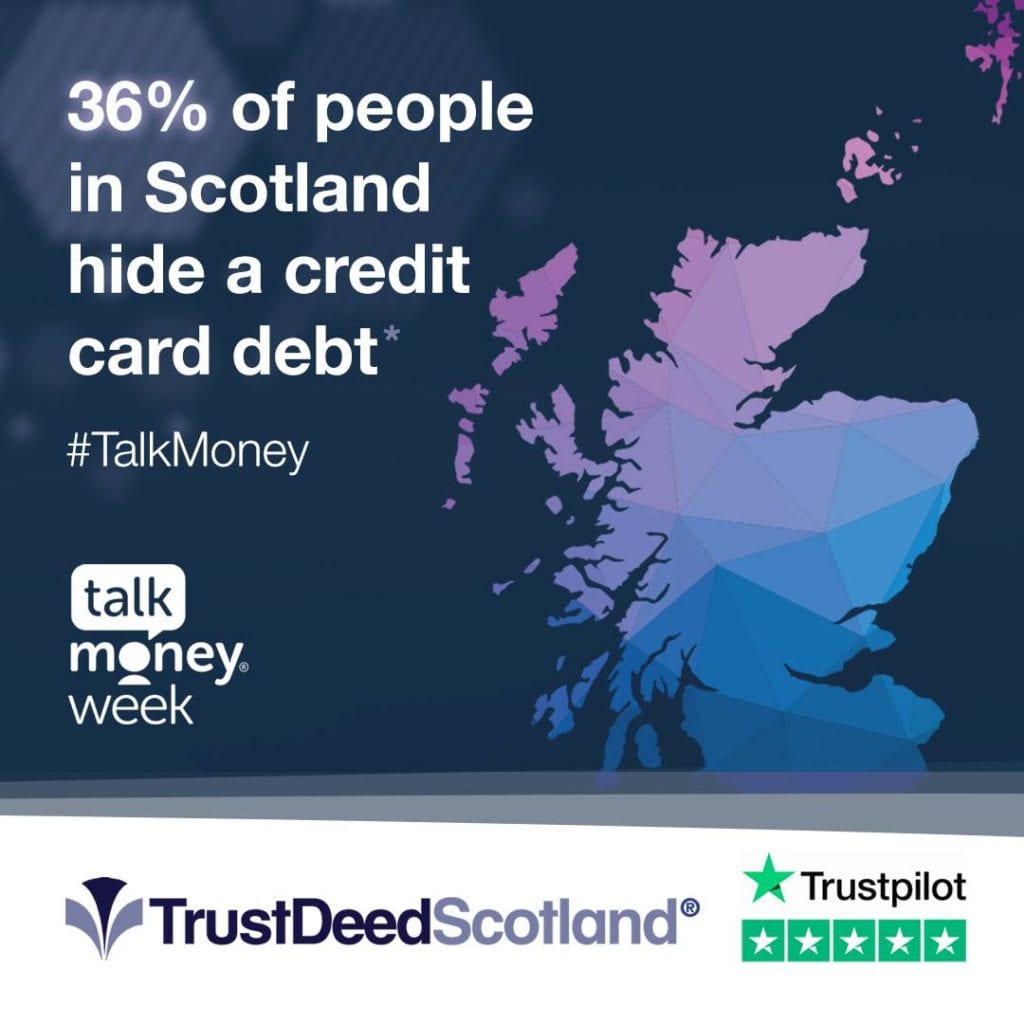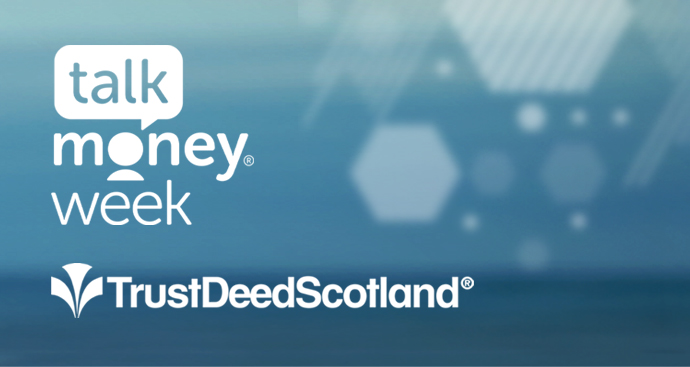A survey has shown that over 36% of the adult population has a hidden credit card debt.
OVER 2 MILLION1 MONEY S£CR£TS KEPT FROM LOVED ONES IN SCOTLAND
Research released by the Money and Pensions Service as part of Talk Money Week 2020 shows that 37% of people in Scotland have kept secrets from loved ones about credit cards, loans and savings
• 37% of people in Scotland admit to keeping financial products secret
• People most likely to keep money secrets from their partner
• In the UK, millennials (25-34 year-olds) are the most secretive generation with three in five (59%) hiding money products
Adults in Scotland have kept over 2 million2 financial products secret from their loved ones, according to a new study of people’s financial behaviours from the Money and Pensions Service (MaPS) to mark Talk Money Week.
Of those who have kept financial products a secret in Scotland, the most common were hidden credit cards (36%). Despite Covid-19 having a widespread impact on people’s finances, the stigma surrounding talking about money in our culture remains – 36% of people in Scotland stay silent about money worries, with some of the reasons they give including embarrassment or fear of being judged.
The research, which surveyed over 5,200 people across the UK, has been launched to mark the start of Talk Money Week (9-13 November), a public awareness campaign run by MaPS to improve financial wellbeing by encouraging people to open up about their finances, from pocket money through to pensions.
Hidden Credit Card Debts
Across the UK, 40% of people said they had secret financial products, with the most common products being:
- Hidden credit cards (36%)
- Undisclosed personal loans (23%)
- Secret savings accounts (21%)

UK millennials proved to be the most secretive generation, with 59% disclosing they have secret financial products, compared to just 25% of retirees. Of 25-34-year-olds who’d kept a product secret across the UK, credit cards, personal loans and overdrafts were most commonly hidden (by 40%, 31% and 23% respectively).
The Talk Money Week study also revealed that across the UK people in relationships tend to underestimate the extent of money secrets their partner keeps from them. While 23% of people in relationships suspect their spouse has kept a money secret, hidden products were found to be even more common, with nearly half of those in relationships (45%) admitting to having an undisclosed money product.
Some respondents told the researchers about secrets that became easier to manage once they opened up to their partners: one respondent claimed, “I was once close to bankruptcy due to credit cards and loans which I did not reveal to my partner until it couldn’t be hidden any longer. I admitted the issues eventually and we sorted it.”
Another respondent said:
“I didn’t tell my husband when I lost control of our credit card debt and ended up juggling cards and minimum payments. Eventually, I admitted it to him and actually acknowledged the amount of debt I now had – he supported me to get onto a Debt Payment Plan which I have been paying for just over a year now, and we are far more financially stable.
We made a choice as a couple to no longer use credit. We also now have a joint account as our main account and only our agreed personal budget for minor expenses which is transferred out to our personal accounts.”
Allison Barnes, Scotland Manager for the Money and Pensions Service said:
“With over 2 million people in Scotland admitting they keep money secrets from loved ones, we are encouraging everyone across Scotland to open up and talk about any money worries you may have during Talk Money Week this week.
“However, we understand there could be a number of reasons why people keep money secrets from those closest to them; a secret savings account could act as a buffer for those who want to escape a difficult relationship or an unpaid bill could be kept under wraps in order to protect anxious family members.
For many who keep money secrets, it can be a feeling of shame or embarrassment that debts have spiralled out of control.
36% of people in Scotland claim to have money worries and initiating a conversation with someone – a friend, family member or expert – can be a first step to start to mitigate and address the problem. Opening up is a valuable start to making problems more manageable, for the benefit of our health, relationships and overall wellbeing.
There’s no better time to start talking than today and the Talk Money Week website offers guidance to help start conversations and prepare yourself ahead of these. You are not alone and as our research shows in Scotland there are many others hiding secrets about money; there are resources available to help tackle some of these secrets including debt advice, as well as money and pensions guidance.
Jasmine Birtles, TV money expert and Talk Money Week supporter, said:
“Talking about money is still off-limits for a lot of people in the UK. Although we’re happy to talk about all sorts of subjects that used to be off-limits, if you ask someone about their income or investments they clam up. Talking about money really does seem to be the last taboo, despite it being something which is on everyone’s mind. In fact, it’s especially helpful to talk about it now, given the impact the pandemic has had on many people’s finances.
It’s particularly important when times are uncertain to talk about money with those closest to us, so we can work together towards a common goal and support each other’s progress. If that’s not an option, you can turn to organisations like the Money and Pensions Service, who have trained specialists who give free, non-judgemental and impartial guidance.”
MaPS has a wide range of resources to help people improve their financial wellbeing, starting with a conversation, during Talk Money Week and beyond.
Guides to talking about money
For guidance on kick-starting conversations about money, see the Money Advice Service’s guides:
• Read their guide on Talking to your partner about money
• Download their guide on how to talk about money.
Take action to work through your money worries
Money Navigator is a simple tool which helps people navigate their finances in the wake of Covid-19 to find a way forward, get money support now and help avoid future debt problems.
Getting expert support
To speak to an impartial expert for free guidance about your money and pensions, visit the following websites and helplines.
Money Advice Service 0800 138 7777
Pensions Advisory Service 0800 011 3797
Pension Wise 0800 138 3944
Contact Trust Deed Scotland on 0141 221 0999 for tailored Scottish debt help.
If your partner is controlling your money or running up debts in your name, you can find further resources and support on the Money Advice Service website.
The research was conducted by Opinium for the Money and Pensions Service. A nationally representative survey of 5,225 UK adults aged 18+ was conducted from 9th – 19th October 2020, of which 440 were from Scotland. The data has been weighted to a nationally representative profile.
1. There are over 5,463,300 million people over 18 (the age you can apply for credit) in Scotland (ONS). The research found that 37% admit to keeping a financial product a secret from family and friends, equating to 2,021,421 people.
2. There are over 5,463,300 million people over 18 (the age you can apply for credit) in Scotland (ONS). The research found that 37% admit to keeping a financial product a secret from family and friends, equating to 2,021,421 products.
About Talk Money Week
Talk Money Week is an annual public awareness campaign, run by the Money and Pensions Service, to get the nation having conversations about money. Talking about finances has been shown to help people make better informed and less risky financial decisions, feel less stressed or anxious and more in control, have stronger personal relationships and help their children form good lifetime money habits. Talk Money Week will take place from 9-13 November 2020.
About Trust Deed Scotland®
Trust Deed Scotland® have helped over 30,000 people in Scotland since 2009.
Specialising in Trust Deeds and the Debt Arrangement Scheme as two formal debt solutions and advising on alternatives.
Find out more about Trust Deed Scotland and get confidential, non-judgemental advice today by calling 0141 221 0999.
